Use your widget sidebars in the admin Design tab to change this little blurb here. Add the text widget to the Blurb Sidebar!
Posted: December 16th, 2015 | Author: Mark Connolly | Filed under: Events | Tags: design, event, products, user research | No Comments »
This month, Melissa Bernais joins us to provide a view into the world of designing for TV. We’ll learn that TV is TV is TV – except when it’s not.
For the past five years, Melissa has been documenting mental models and designing software used by TV broadcasters and service providers, and she’s learned that while roles and responsibilities may be similar from master control room to master control room, there’s wide variety in terms of goals, needs, workflows, business model, industry structure, technological standards, and even political concerns. And that’s just in North America; add the rest of the world into the mix, and… oh man.
Knowing what the end game is isn’t always enough. Understanding how a customer needs to get there is everything. The fun includes:
- exploring the differences between Canadian, American, Asian, Australian and European broadcast business models
- figuring out how to finesse the goals and needs that these models bring in on-site & remote customer engagements
- disseminating that information out to Product Strategy
- incorporating those needs into tools that can be sold worldwide
Melissa will share what happens when a small UX team champions the need for customer research to a multi-national company serving an International customer base. She’ll talk about everything from finding and gaining internal, organizational trust and locating customers that you can talk with, to the language barriers, cultural differences, opposing priorities, and product frustrations that come with consulting directly with the people who buy the things you design.
She’ll also look at what happens when you need to distill a wide range of competing needs into products that accommodate current use patterns, anticipate future needs, and can scale to new, unforeseen methods of connecting people with content — doing all of this for customers in very different situations.
About Melissa Bernais
In her own words:
“Practicing UX for over a decade, I’ve had a lot of job titles – architect, engineer, designer. And while none of them are wrong, they’re not quite right either. I draw boxes. I talk with people. I solve problems.”
“UX is my second grown-ass person career. Looking back on things, I can honestly say that what I do now has its roots in what I used to do, and what I went back to school for – connecting people with what they want in the easiest way possible. I’ve worked in the music industry in sales, licensing and publicity, trained to become a librarian, and spent time both agency and client-side as a UX practitioner. It’s all been pretty great fun.”
“I have recently added a broken finger tip to my list of self-inflicted, completely avoidable, accidental injuries. Just a little bit about me, y’all.”
When and where
Thursday January 21, 2016
5:30 to 7:00 pm
Communitech Hub
Atlas/Matrix Room
[View on Google Maps]
Please register for this free event

Posted: March 26th, 2014 | Author: Mark Connolly | Filed under: Events | Tags: user experience, user research | 2 Comments »
How can you broaden your sphere of influence within the field of user experience? You can start by building your muscles! Steve will take a look at some fundamental skills that underlie the creation and launch of innovative goods and services. He will discuss the personal skills that he considers to be “the muscles of innovators” and the ways you can build these important muscles, including noticing, understanding cultural context, maintaining exposure to pop culture, synthesizing, drawing, wordsmithing, listening, and prototyping. Along the way, he will demonstrate how improving these powerful skills will equip you to lead positive change.
Steve Portigal is the founder of Portigal Consulting, a bite-sized San Francisco firm that helps clients to discover and act on new insights about themselves and their customers. That means that he’s important enough to have a company named after him, but not important enough to have an invincible army of minions… yet. Steve delighted conference attendees at Fluxible 2013. He’s also author of Interviewing Users: How to Uncover Compelling Insights, a Rosenfeld Media book.
Sounds like a great time, right? Register now!

Thursday April 17, 2014
5:30 to 7:00 pm
Communitech Hub, P2P Room
151 Charles St. W.
Kitchener, ON N2G 1H6
Posted: March 4th, 2014 | Author: Mark Connolly | Filed under: Events | Tags: user research | No Comments »
 Who doesn’t like a great metaphor? If you’re a UX practitioner or researcher, you love them right?
Who doesn’t like a great metaphor? If you’re a UX practitioner or researcher, you love them right?
In this month’s session, join Janice de Jong, Julia Thompson, and Susan Simon Daniels as they use the three fates of Greek mythology to illustrate truths about UX research.
The three fates, who represent destiny, are:
- Clotho. The spinner who creates the thread of life. She is the youngest and represents what is possible. Clotho is pictured with a spindle and thread.
- Lachesis. The allotter who measures out life. Lachesis is in the middle and decides what kind of life a person will lead and for how long.
- Atropos. The last and oldest fate is the one who cannot be turned away—she cuts the thread when the time has come.
There’s an interesting parallel between the three fates and the three stages of research throughout a product’s life cycle:
- Clotho would be trend research typically started earliest and carried out on the farthest horizon, about three years from now. Hear Janice de Jong explain the purpose of trend research, strategies on how to conduct this analysis and how trends influence the product life cycle.
- Lachesis would be research around product ideas and concept exploration typically carried out a year or two before a product comes to market. Listen to Julia Thompson describe the goals of exploratory research, best practices for methodologies and how research influences product meaning.
- Atropos would be research on the product’s usability typically carried out in the months before the product is launched. Hear Susie Simon Daniels identify goals for usability research, best practices for studies and how usability research impacts the product being shipped out the door.
By weaving these three stages of research together, you’ll learn how to spin out a meaningful user experience. We’ll follow a product case study to show the research fates at play through the three stages of trends, exploration and usability research.
Sounds like fun, right? Register now!

Thursday March 20 , 2014
5:30 to 7:00 pm
Communitech Hub, P2P Room
151 Charles St. W.
Kitchener, ON N2G 1H6
Posted: June 29th, 2010 | Author: Katie Cerar | Filed under: Events | Tags: think aloud, usability, user research | No Comments »
Last Thursday, June 24th, the UX Group met to learn more about the Think Aloud method from Guelph Master’s student, Amy Gill. Amy graciously gave us a presentation on her Master’s work, which has been focussing on learning about the psychology roots of the Think Aloud method, and how it can and should be used by UX practitioners today. We had almost 30 attendees this month, which made the discussions lively and insightful.
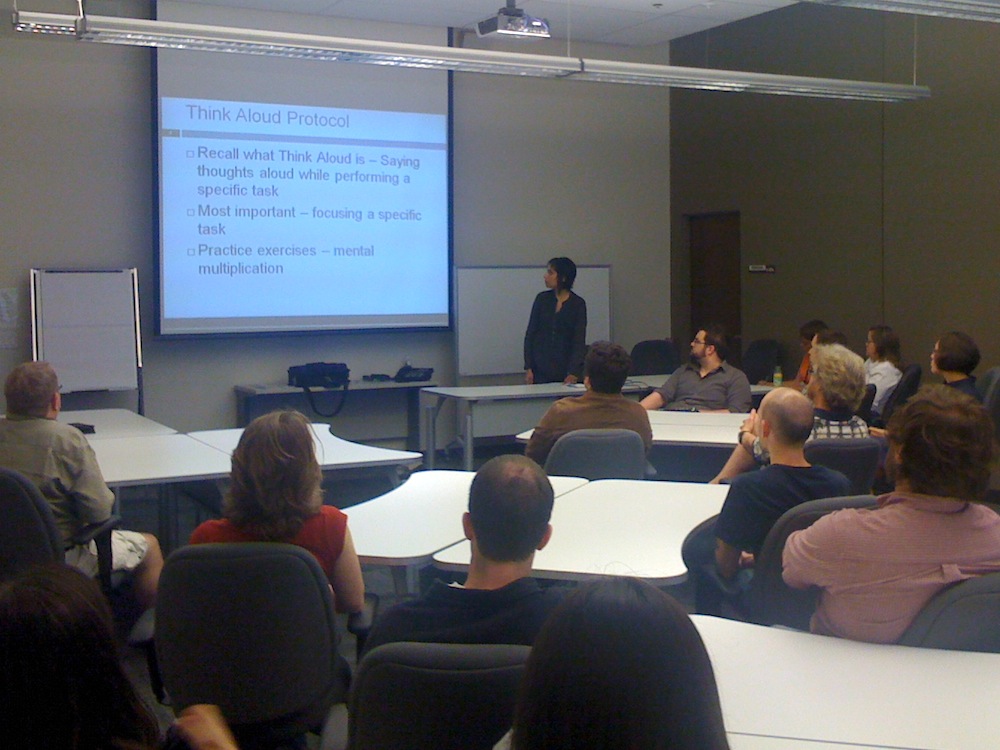
The session taught us a lot of about how Think Aloud was created, and some very interesting guidelines for how to use the method to gather the best results. The presentation was a great lead-in to an exciting discussion. Amy brought to light a number of interesting points, including:
- Think Aloud was originally created in the psychology tradition to learn about the thought processes inside of subjects’ heads
- We can gather great quotes to convince others of changes that need to be made
- It can provide us with insight into the mental models and the assumptions of the user
- The method doesn’t alter though patterns if we stick to level 1 and level 2 statements that do not require extra thinking or meta thinking.
- When we ask “Why?” the user has to start thinking about what they should say – altering their thoughts
- Asking “Why?” can also produce inaccurate reports as users tell us what they think we want to hear
After Amy’s presentation, the discussion broadened to include topics such as:
- When we ask “Why?”
- How we know when usability testing is being done “correctly” or is having a positive impact
- How people in the community incorporate usability testing, and when
If you missed Amy’s presentation, she has graciously provided us with a number of resources which were used or mentioned throughout her talk:
Thanks to Amy and everyone who showed up to see her present and participate in the insightful discussions. See you in July!
Posted: June 23rd, 2010 | Author: Julie Rutherford | Filed under: Events | Tags: think aloud, usability, user research | No Comments »
Hi everyone!
The User Experience Group planning committee has a great night scheduled! We have some video examples of think aloud studies that we will be showing and we’ll discuss best practices that we’ve used when asking participants to think aloud in usability tests. Amy Gill, who is pursuing a Masters degree in Applied Computer Science at the University of Guelph, will also be sharing more information about her research about think aloud practices in usability testing. Some of us from our UX group volunteered as participants in Amy’s studies, so we know we’re in for a treat!
Please click here to register for this event and hope to see you there!
Thursday, June 24, 2010
5:30 to 7:00 pm
Accelerator Centre
Meeting Room #2
295 Hagey Blvd., Waterloo
[Map]
Posted: May 26th, 2010 | Author: Mark Connolly | Filed under: Events | Tags: think aloud, usability, user research | No Comments »
Thursday, June 24, 2010
5:30 to 7:00 pm
Accelerator Centre
Meeting Room #2
295 Hagey Blvd., Waterloo
[Map]
Many of us have used think aloud sessions as a way of understanding how users interact with a software product. In tonight’s meeting, we’ll run some actual sessions to see how a think aloud session works in practice.
We’ll also hear from Amy Gill, who is a pursuing a Masters degree in Applied Computer Science at the University of Guelph under the guidance of Dr. Blair Nonnecke (no stranger to the UX Group). The focus of Amy’s research is the think aloud method which is often used during usability testing. Her research aims to explore current think aloud practices to compare the use of think aloud in the usability field with the original use of think aloud in psychology. For this research, practitioners in the usability field were interviewed to gain an understanding of current think aloud practices.
RSVP
Posted: May 16th, 2010 | Author: Julie Rutherford | Filed under: Events | Tags: design, user research, wireframes | No Comments »
Hey UXers!
Hope you can attend our next UX group meeting tomorrow (May 17th) from 5:30-7pm at Barley Works at the Heuther Hotel.
To read more about what we’ll be discussing and to register, check out our blog post about the event: NUIs in your living room, in a pub.
If you missed our last UX group meeting on April 19th, here’s a quick recap. We had 20 UXers attend our “show & tell” session, which turned out to be very interactive and fun! We split into groups and each group listened to design challenges and ideas that their peers have been working with.
Then, each group picked a representative that presented their design challenge to the whole room. Some of the interesting ideas we heard about include:
- Design challenges for group collaboration and some of the time wasters that get in the way when individuals are working together in an office or on a tabletop surface.
- How Adobe Fireworks can be used for wireframing and for finished designs. We saw how this can be a great tool for creating a design and gathering commentary.
- Overview of recommendations for revamping a website that is used by students and staff at Wilfrid Laurier University.
- Saw examples of how menu options for an application were brought from early prototypes to the final product.
- Got a sneak peak of a new feature for math software and heard about the design challenges of designing for a small space in an existing application.
Thanks to everyone who shared their ideas and opinions at this event! Photos from the event are posted below. Hope to see you at our event tomorrow!
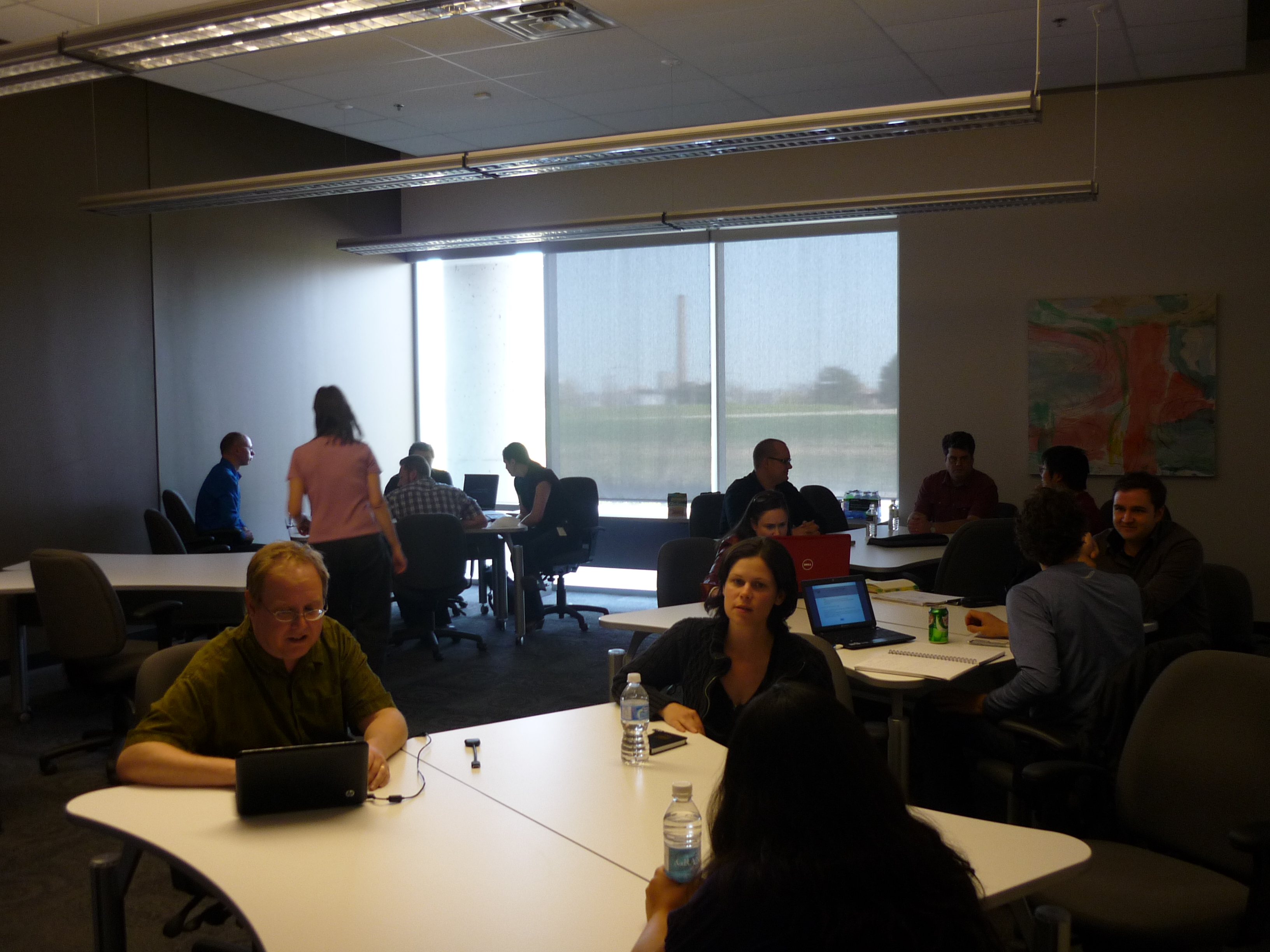
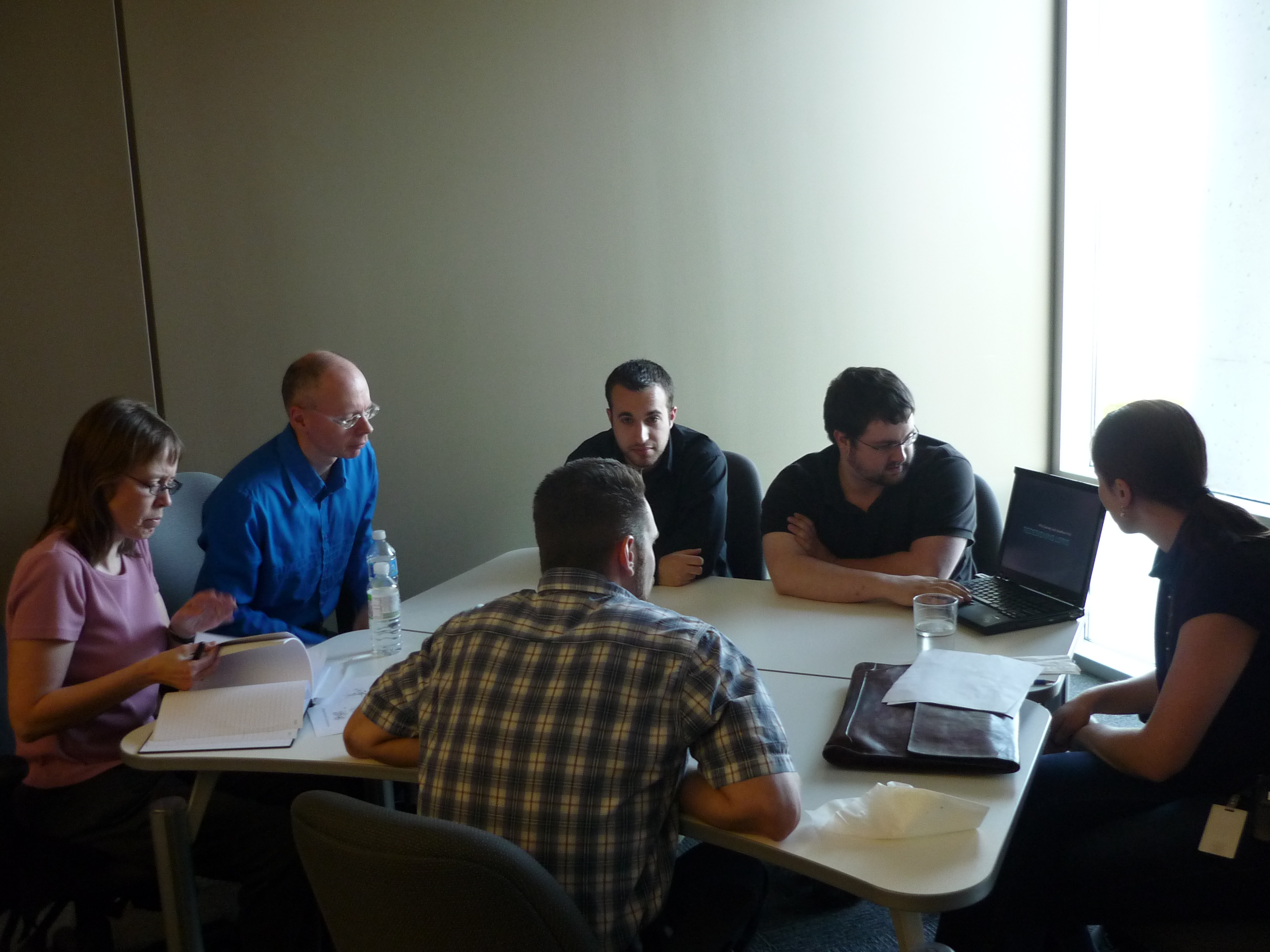
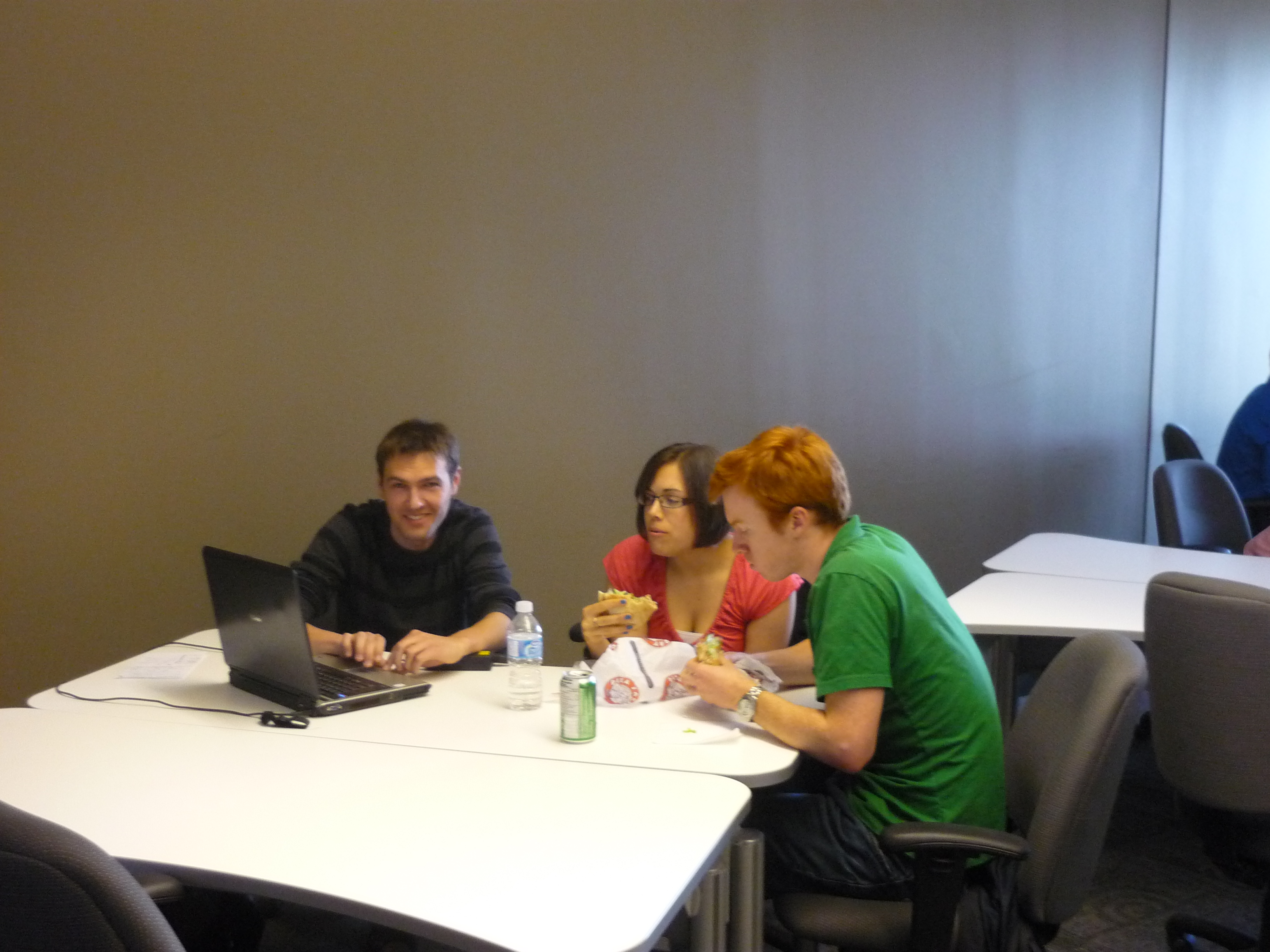
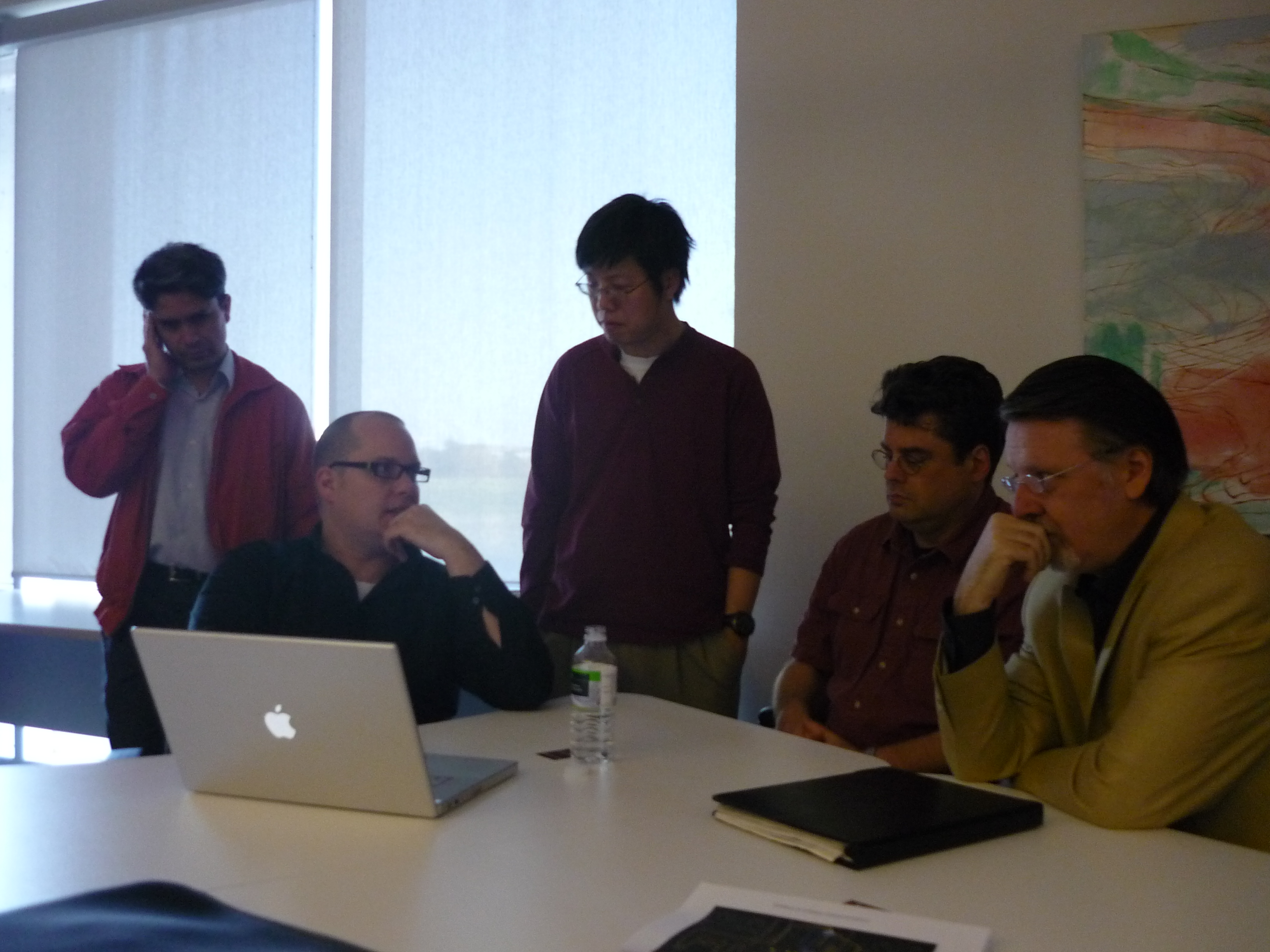
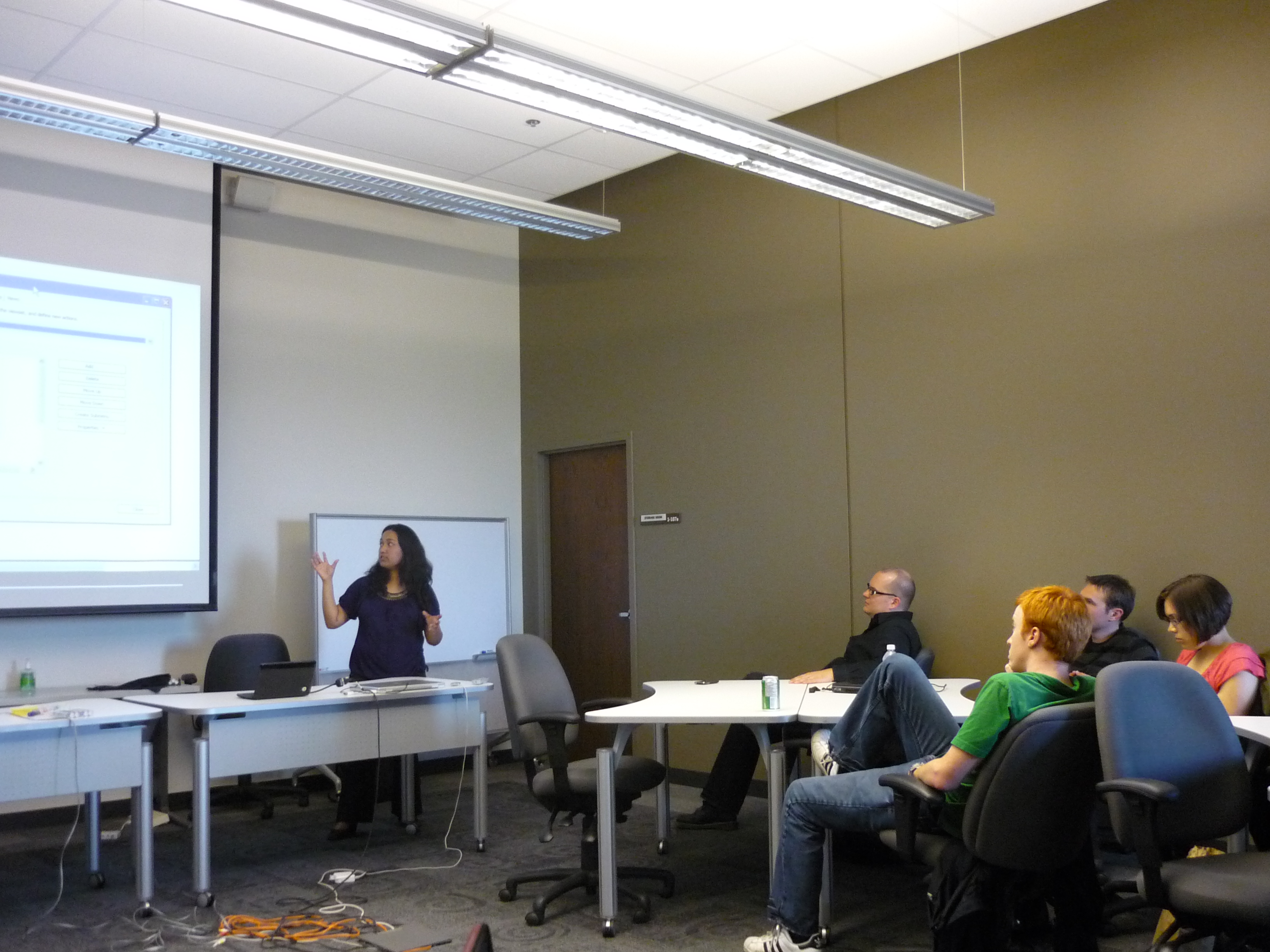
Posted: April 1st, 2010 | Author: Robert Barlow-Busch | Filed under: Events | Tags: deliverables, design, design research, event, ixda, personas, products, sketching, user research, wireframes | No Comments »
Monday April 19, 2010
5:30 to 7:00 (Then drinks afterwards if you’re interested!)
Accelerator Centre
Meeting Room #2
295 Hagey Blvd., Waterloo
[Map]
A chance to share our work and learn from each other
This month we’re hosting our first UX Show and Tell, an event that’s become fairly popular with other IxDA and UX-related groups around the world. It’s no wonder, as it’s quite a lot of fun and is a great way to learn from each other.
Bring examples of anything from your work: research artifacts, personas, sketches, wireframes, design comps, prototypes, documents… anything goes. Tell us a challenge you faced. Or show us a problem you solved. Bring a question you have, or simply show off something you’re proud of.
We’ll keep things brief, so please choose only one or two pages from that 5-pound design specification. 🙂
Do I NEED to bring something to show?
No, it’s not required that you bring something to show. But we certainly encourage you do so, as you’ll be surprised how much fun it can be. Remember, you don’t have to show a lot. Even a single screenshot can be plenty. And yes, you DO have something that others would find interesting or valuable!
RSVPs requested
If you’re hoping to attend, please click here to RSVP via Communitech. As usual, everyone’s welcome to join us, so spread the word!
Join us for informal drinks and chitchat afterwards
After the event ends at 7:00, we’re planning to get together at a nearby pub or restaurant. If this sounds like fun, just hang out for a few minutes afterwards while we see who’s interested and decide where to go.
Posted: October 6th, 2009 | Author: Robert Barlow-Busch | Filed under: Events | Tags: design, design research, ethnography, personas, user experience, user research | No Comments »
Thursday, October 15, 2009
5:30 to 7:00 pm
Please note the special LOCATION this month:
Primal Fusion Inc.
7-258 King Street North, Waterloo
Need to park? You may park in any spot around the building, regardless of whether it’s marked “Primal Fusion” — and yes, that includes the bizarre diagonal spots by the sidewalk!
[Map]
Personas in product design
Personas are a type of user profile that have become a common tool in the product design process, although you’ll find both advocates and skeptics of their value. Done well and at appropriate times, personas can galvanize teams around a product’s vision. Done poorly, they are little more than an exercise in creative writing.
In this session, Robert Barlow-Busch (Twitter @becubed) will share case studies and stories from the trenches to illustrate how to get the most from personas. What exactly is a persona? When are they useful — and not? How do you actually create them, and what do you do with them afterwards?
RSVPs requested
If you’re hoping to attend, please help us anticipate numbers by RSVP’ing to Wanda Eby at Communitech. Thanks!







